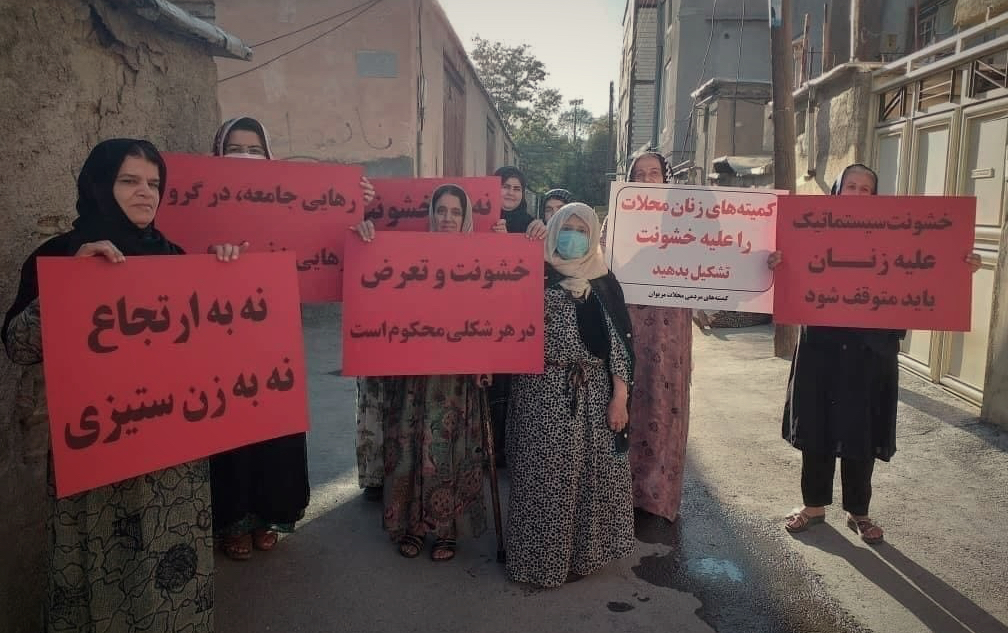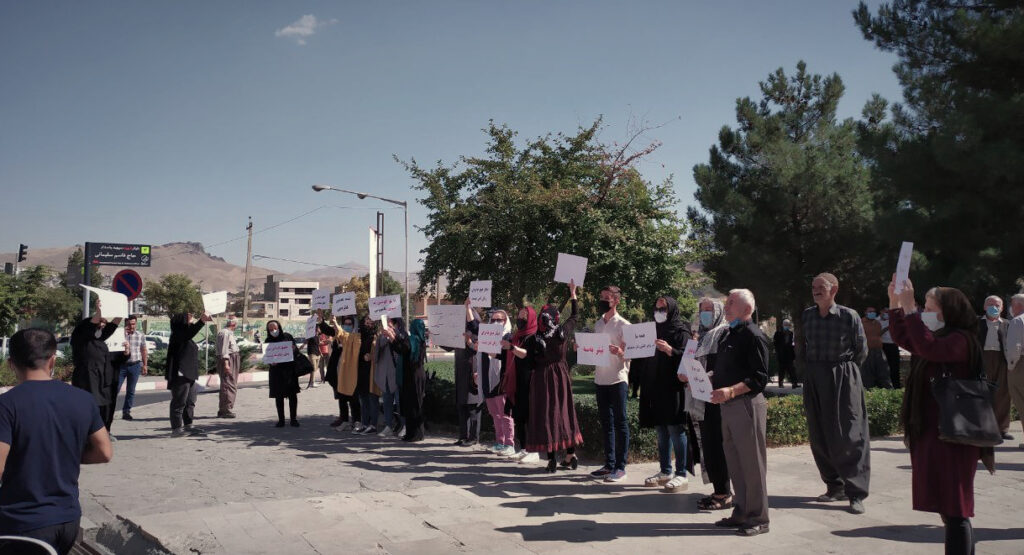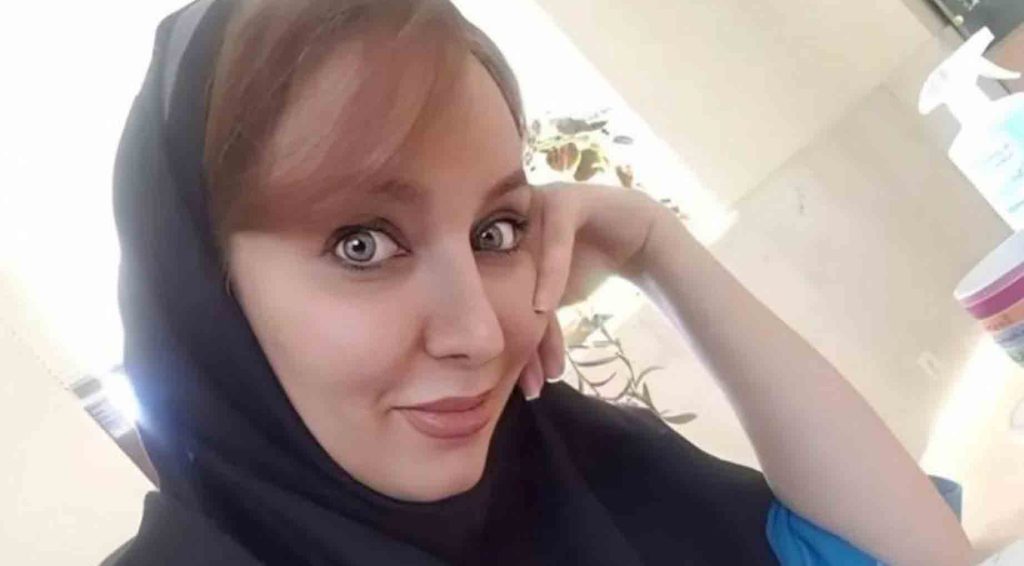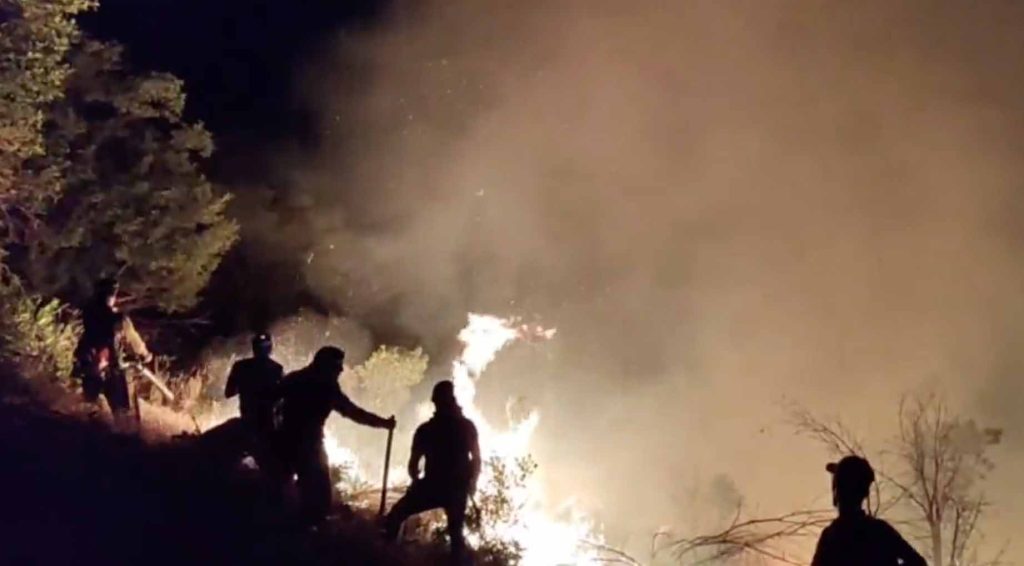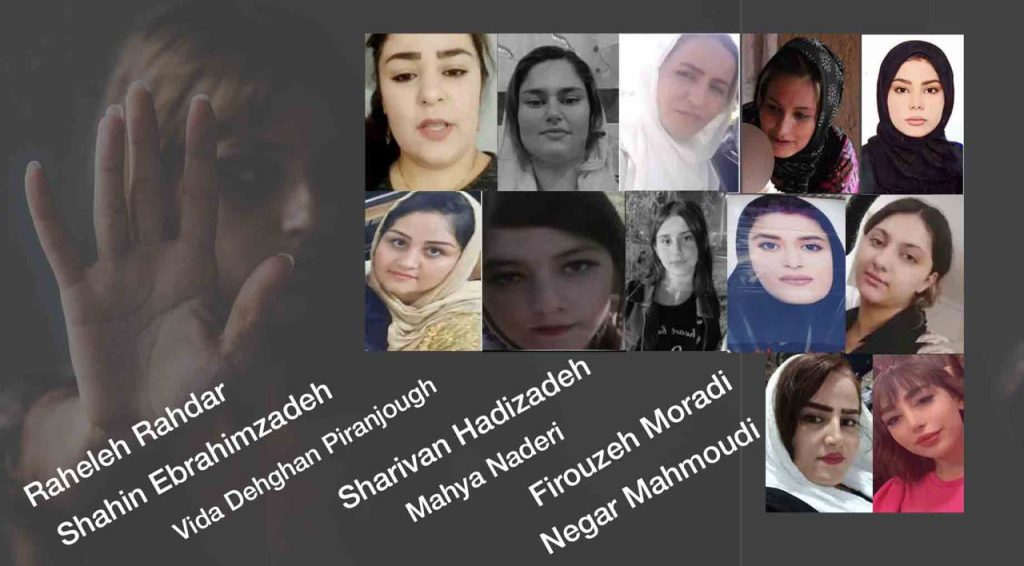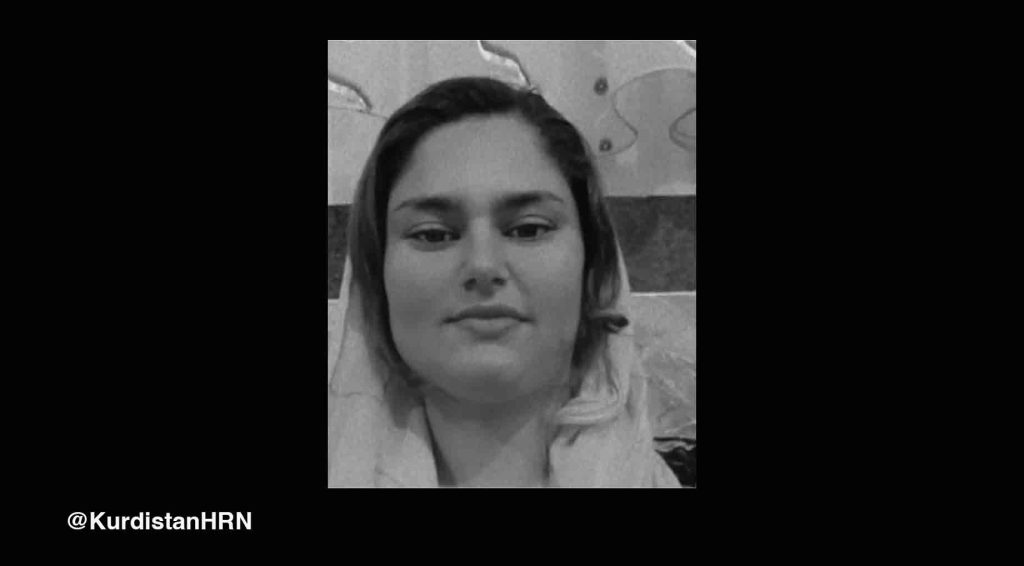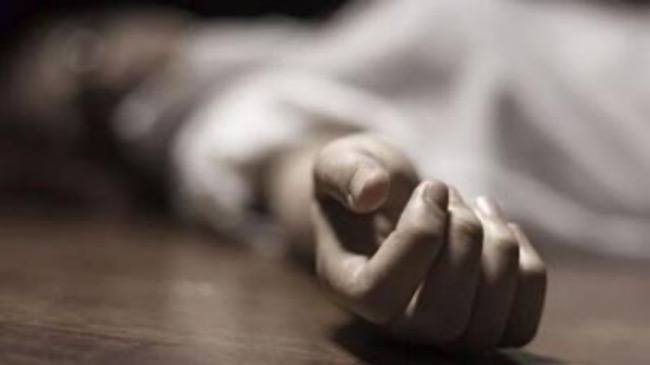Fatemeh Karimi (Source: bidarzani.com)
On 3 October, a physician at Kowsar Hospital in Sanandaj, Kurdistan province, named Iman Navabi, drew attention to a femicide case on his personal Instagram account.
In this post, which was removed sometime later from his account due to pressures, he said:
“They brought a 22-year-old girl whose father burned 85% of her body with gasoline. And it was because she had a boyfriend.”
However, Faezeh’s family, especially her father, said the reason for their daughter’s death was “self-immolation” caused by depression.
Mohammad Jabbari, the Public and Revolutionary Prosecutor of Kurdistan province, spoke about the young woman’s death and said: “This girl is indeed burnt, but it is being investigated whether she burned herself or her father burned her.”
Although Faezeh spoke to the doctor before her death and insisted that her father had burned her, the prosecutor has not issued an arrest warrant for her father, saying, “so far, no one has filed a complaint regarding the incident”.
While Faezeh’s father is free to hold his daughter’s funeral and burial ceremonies, and his name and phone number are included in the death announcement of his daughter saying she “died by divine providence” so that people can call him for condolences, Faezeh’s doctor is the one judicial authorities threaten for covering her horrific death.
The prosecutor added: “This is a violation of laws, and this person should not have posted it on the internet when nothing has been clarified yet.”
But the young doctor continues to write in defence of Faezeh: “My last post is unavailable. I have tried to support an underdog and will continue to do so. Nobody heard her cries. This case will continue through legal experts.”
Shortly afterwards, more details were released on the young woman set on fire by her father. It was said that the victim Faezeh Malekinia was a 22-year-old single woman from the Korkoreh (also Dowlatabad) village of Sanandaj.
Some people who knew the young woman closely said her parents had separated years ago, and Faezeh was forced by her father to marry a much older man at the age of 15.
But the marriage does not last long, and Faezeh separates from her husband after two years. She later wanted to marry someone else but was opposed by her father.
The family of the man that Faezeh wanted goes to her house to ask for her hand from her family several times, but the father disagrees.
According to some relatives, Faezeh went with the person she loved to one of the border cities of Kurdistan province for a few days. They allegedly intended to leave the country illegally but later returned by force or voluntarily.
According to some others, despite her father’s opposition to Faezeh’s marriage, photos posted of her and the person she loved angered her father and ultimately led to her father burning her.
Whatever the reason, Faezeh’s father imprisoned her in the toilet of their garden two days before burning her and then poured gasoline on her, setting her on fire.
Faezeh’s family took her to Kowsar Hospital in Sanandaj to show that she had set herself on fire.
She had severe injuries and told her doctor that her father had burned her. “She begs me with her eyes to save her”, the doctor wrote in the same Instagram post. In a conversation with several woman activists in Sanandaj, Faezeh’s boyfriend completely denied the allegation of self-immolation and said that Faezeh’s family made it up.
A report published by the Zhivano Women’s Association, an association aimed at defending women’s rights, which has been active since April 2020, said:
“In recent days, the Malekinia family in Dowlatabad (Korkoreh) village announced that Faezeh was depressed and had committed suicide. This is not a new scenario. Women’s rights and human rights activists have repeatedly witnessed this shift in the narrative that many femicides are justified by the name of suicide.”
Despite denying Faezeh’s murder and the lack of prosecution by the judiciary, that her father committed the burning is evident to many women activists. In this regard, a group of women activists gathered in front of the Sanandaj courthouse on 6 October, a few days after Faezeh’s death. These people demanded a change in the laws supporting violence against women and the prosecution of Faezeh’s case and other femicide cases in Kurdistan province.
They carried out a protest rally and held placards that read “Nowhere is safe for women”, “We want to clarify Faezeh’s death”, “Yesterday Sargol, today Faezeh and tomorrow…”, “We are all Faezeh”, “We are all responsible against killing women”, “No to killing women”, and “My human rights are not to be argued upon”.
In addition to demanding changes in the misogynistic laws that have exacerbated violence against women and deprived them of their security and human rights, the demonstrators also called for the legal pursuance of femicide cases that kill women under various pretexts.
During the rally, three women protesters met with the Public and Revolutionary Prosecutor of Kurdistan Province. In a conversation with the prosecutor, they rejected the speculation that Faezeh Malekinia had committed suicide. Following statements by women activists, the prosecutor announced that the case was being investigated and that detectives would pursue it.
According to the latest news published on 7 October, Faezeh’s father, Habibollah Malekinia, has been arrested for interrogation. However, as is clear from the statement of the Zhivano Women’s Association, violence against women is systematic, and femicide is beyond individual factors. Without making systematic changes, the cycle of femicide would remain as it has been. The statement from the Zhivano Women’s Association said:
“The dehumanization of women in the framework of discriminatory laws and the domination of anti-woman culture, and the marginalization of half of the potential of social force, continues to lead to disaster; but know that whether you burn us, kill us, imprison us, take custody of our children from us, hand over our children’s records to their fathers and choose for us, pay us less for equal work, write your laws for one gender, etc., we will every day be more determined to pursue our human rights and we believe in brighter tomorrows and the construction of a society free of discrimination and violence. We will never give in to inequality just for being born and being a woman, and we will cry out for equality to the last breath because we believe that our human rights are not a matter of discussion.”
The statement, which explicitly emphasizes anti-woman laws that promote violence against women, said:
“With the recurrence of such tragedies, the question is how long will laws such as Article 301 of the Islamic Penal Code validate child murder? Such laws will not only not give dignity to the father and paternal grandfather but will undoubtedly instil in the children a sense of insecurity, distrust and lack of intimacy, and will never lead to a safer environment in our homes. It is very thought-provoking how lawmakers sleep in peace and do not realize that society is becoming more insecure for women.”
From the hidden angles of the tragic murder of Faezeh Malekinia, two points can be mentioned.
1) The extent of violence against women, especially femicide, has been systematically hidden in Iran. There are many cases of femicide that are closed as cases of “suicide” and “self-immolation” without any legal or judicial prosecution. For example, if Faezeh’s doctor had not mentioned her murder, no one would have been aware of the horrific tragedy that had taken place. And the many psychological, physical, and even sexual violence brought on her as a child bride through a forced marriage until the age of 22 would have been justified by the name of “depression”. As a result, as many women’s rights activists have warned for years, many cases of homicide have never been reported and are hidden under pretexts such as suicide.
Although the violence that leads women to self-destruction and suicide, and is itself an indirect form of femicide, in not underestimated, to be killed, and in the case of Faezeh, to be burned alive with gasoline by a father who was supposed to play the role of guardian of his children in the so-called “holy” institution of the family, shows most clearly the bare violence against women. Such cases can further damage the misconception of the sacred institution of the family and expose the harms that women experience every day in its context. It is in such an atmosphere that one should be worried about the fate of women, specifically Faezeh’s other sisters so that they do not suffer such a fate.
2) In recent months, many women have been killed by men in their families under various pretexts. They have fallen victim to a patriarchal ideology that deprives women of even their most basic human rights. However, contrary to the stereotypical thinking that portrays them as just “passive” victims, these women are no longer willing to accept their inevitable destiny in their personal lives. And they resist in the face of the daily pressures and violence they face.
Faezeh frees herself from forced marriage and falls in love with a man she chooses despite her father’s objections. Sargol Habibi, who is the victim of a child-bride case and is forced by her brothers to marry a man she has no interest in – but cannot divorce due to having two children and her family’s opposition – turns to a relationship of her own choosing. Laleh Kazemi no longer turns a blind eye to her husband’s extramarital affairs and seeks divorce by getting a lawyer, but all of them lose their lives.
But this group of women were not passive victims, but people who resisted the prevailing norms of society and tried to continue their lives based on self-respect and their individual and human desires. Desires and demands that do not entirely agree with the prevailing norms of society. In a patriarchal society that wants women only within the family and under the control of the men of the family, these women have resisted, and the cost of their resistance has been their whole life.
Women killed by their families can be compared to medieval witches in Europe. As Isabel Perez Molina says: “Any woman who was independent in any field was considered a “witch” candidate”.
She writes: “The inspectors believed that women who were out of patriarchal control were disturbing elements of the established order of society, which included a wide range of single women, widows, poor women, old women, old women, obese women, traditional healers, and so on.”

